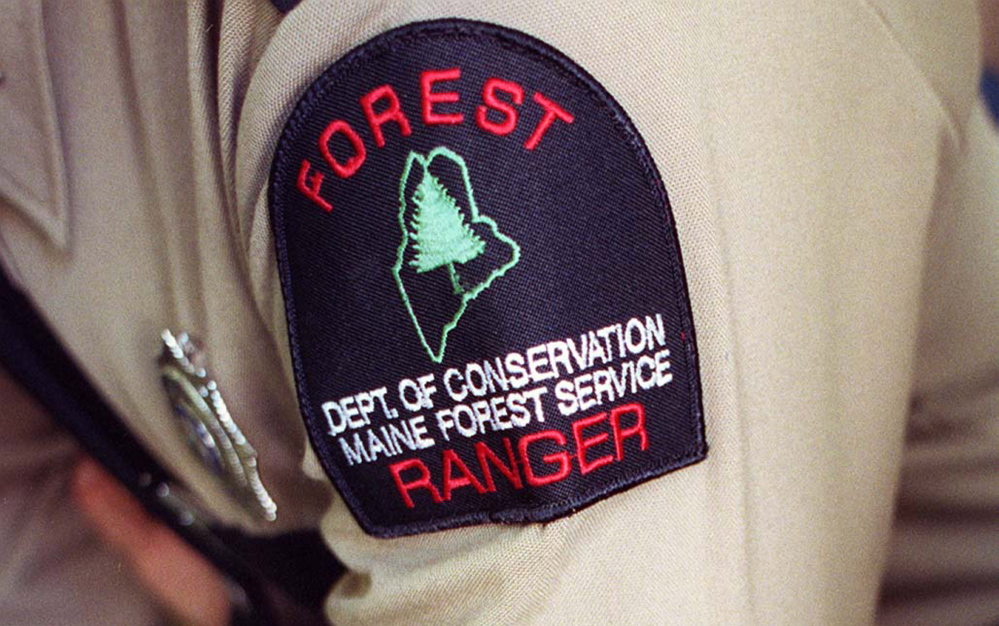The LePage administration wants to put a new type of law enforcement officer in Maine’s forests as part of a shake-up and consolidation of the agency that oversees Maine’s forests and park lands.
Potentially the highest-profile and most controversial of several proposed changes within the Maine Department of Agriculture, Conservation and Forestry includes stripping forest rangers of their policing responsibilities in order to have rangers focus on fighting wildfires and protecting forest health.
Instead, law enforcement tasks that are now handled by forest rangers – from investigating vandalism or marijuana-growing operations to helping with emergency response – would be handled by a new group of “natural resources law enforcement officers.” They would be able to carry weapons and arrest suspects of crimes.
The governor’s proposed budget would eliminate more than 20 forest ranger positions around the state while creating seven new natural resources officer positions. While many of those ranger positions are currently vacant, the department has sent notices to 13 rangers that their jobs would be eliminated if the budget is approved as written.
The new natural resource officers are part among several organizational changes proposed for the department, which was created by merging the conservation and agriculture departments together three years ago. Another proposal, for example, would fold part of the Maine Bureau of Parks and Lands into the Bureau of Forestry.
The purpose of the proposed changes to Maine’s forest ranger program was two-fold, Commissioner Walt Whitcomb told members of the Legislature’s budget-writing committee during a budget briefing.
First, it would give the department a “separate force of highly trained, specialized law enforcement representatives” able to respond to potentially dangerous situations. Unlike forest rangers, those natural resources law enforcement officers would undergo the same training as a game warden or a marine patrol officer and would be allowed to carry weapons.
Secondly, Whitcomb said, the change would allow forest rangers to devote more of their energy to firefighting, monitoring the health of Maine’s forests and working with landowners on pest management. That is particularly important, Whitcomb said, as Maine’s forests face the threat of invasive pests such as the emerald ash borer and the latest cyclical outbreak of the spruce budworm that devastated parts of Maine’s forests in the 1970s and 1980s.
Whitcomb described the proposal as a “seismic change” for the agency.
“Were there glaring deficiencies? No,” Whitcomb told a joint meeting of the Legislature’s Appropriations and Financial Affairs Committee and the Agriculture, Conservation and Forestry Committee. “But looking ahead, we feel we can better position people to respond to the problems that face us.”
LePage’s proposal comes less than a year after the governor – citing costs and training concerns – vetoed a bill to allow forest rangers to carry guns even though he said he supported the concept. Forest rangers had sought the right to carry weapons because they patrol and investigate crimes in often remote areas of the state. Rangers currently carry pepper spray and handcuffs.
A representative from the Maine State Law Enforcement Association, which represents forest rangers and other law enforcement officers on policy issues in Augusta, could not be reached for comment Tuesday.
But a post on a Facebook page for the “Maine Forest Rangers Association” lamented the governor’s budget proposals.
“He has created (7) SEVEN natural resource officers to handle all law enforcement that once 74 rangers handled,” reads the post dated Jan. 14. “This action essentially eliminates the oversight in the natural (resources). This budget also leaves Maine’s most venerable businesses and citizens without a voice or recourse when victimized.”
Several committee members questioned how six natural resources officers statewide plus one supervisor would handle all of those calls. Sen. Linda Valentino, D-Saco, also asked how Whitcomb planned to pay for the additional training or buy guns and other protective equipment – something that the department currently cannot do without legislative authority.
Whitcomb responded that language in the governor’s budget would also allow the department to make those purchases without legislative oversight in the future.
Another consolidation proposal from the LePage administration is also getting kickback from some interest groups.
Whitcomb has proposed reducing the number of bureaus within the department from four to three. The proposal would split up the Bureau of Parks and Lands, with state parks to be managed by the Bureau of Conservation and public reserve lands to be managed by the Bureau of Forestry.
But Eliza Donoghue with the Natural Resources Council of Maine said the Bureau of Parks and Lands manages properties for different values – especially for recreation and public access – than timberland managed for silviculture by the Maine Forest Service.
Jenn Burns-Gray with Maine Audubon said she feared the LePage administration could be aiming to increase the amount of timber harvesting on public reserved lands again, as it proposed last year. Burns-Gray and Donoghue also questioned the necessity of the consolidation if it wouldn’t save the state money.
“We just went through a very significant merger, so you should let that play out,” she said.
Clarification: This story was revised at 10:25 a.m., Jan. 21, 2015, to clarify that the LePage administration proposal would split up the Bureau of Parks and Lands, with state parks to be managed by the Bureau of Conservation and public reserve lands to be managed by the Bureau of Forestry
Send questions/comments to the editors.




Success. Please wait for the page to reload. If the page does not reload within 5 seconds, please refresh the page.
Enter your email and password to access comments.
Hi, to comment on stories you must . This profile is in addition to your subscription and website login.
Already have a commenting profile? .
Invalid username/password.
Please check your email to confirm and complete your registration.
Only subscribers are eligible to post comments. Please subscribe or login first for digital access. Here’s why.
Use the form below to reset your password. When you've submitted your account email, we will send an email with a reset code.